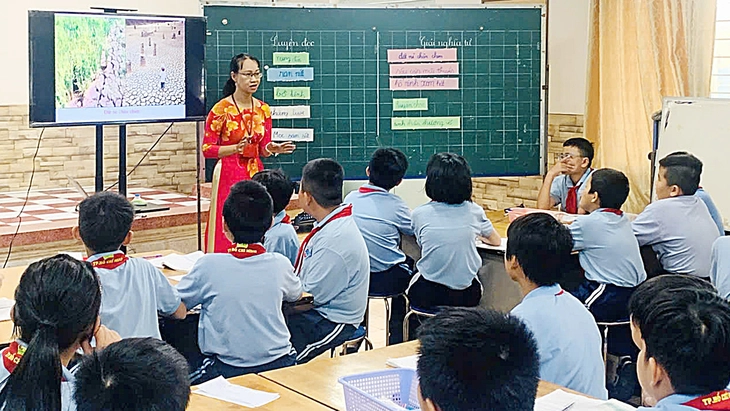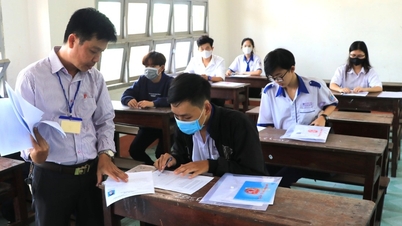
A Vietnamese language lesson in an open class at Phu Tho Primary School, Ho Chi Minh City - Photo: NTCC
Mispronunciation can sometimes lead to misspelling. Correcting this problem is an important contribution to preserving the purity of Vietnamese.
Tuoi Tre talked with teachers, education managers, and language scientists to find solutions to correct speech impediments in students.
- Associate Professor, Dr. HOANG DUNG (lecturer of language department, faculty of literature, Ho Chi Minh City University of Education):
The Ministry of Education and Training needs to take the lead and do this immediately.

Most people think that language correction in education is the same as correction in medicine.
People find that writing wrongly the question mark, the falling tone, "l", "n"... is because we cannot distinguish between the question mark, the falling tone, the final "l", "n", "g"... so first, people correct the error by having to read and distinguish them, if you read correctly then you will write correctly. But in my opinion, scientifically that is not correct.
Most Vietnamese people may make mistakes here or there when pronouncing. Meanwhile, there is still a large percentage of people who write correctly.
Correct spelling does not necessarily require transliteration because if it did, it would be inexplicable why some people pronounce incorrectly but still spell correctly.
Speaking correctly is more difficult than writing correctly. We have to ask when it is necessary to translate sounds. In my opinion, it is when speaking incorrectly becomes a barrier to communication or a sign to mark others down.
For example, when someone pronounces "l" and "n" incorrectly, people laugh at and judge them, while many people pronounce "troi" as "gioi" and the listener does not criticize. In the South, there are also some mispronunciations that lead to discomfort in communication.
There are mispronunciations that need to be corrected and mispronunciations that do not need to be corrected. Pronunciation correction should focus on some mistakes. To do this, the Ministry of Education and Training needs to issue a policy based on research and place orders with scientists.
It is also necessary to discuss and summarize which types of lisping need to be corrected when speaking and which types of lisping need to be corrected when writing.
We do not expect these problems to be resolved quickly. After the policy is in place, the education sector will organize the compilation of separate textbooks for those who have mispronunciations due to regional dialects.
Curing lisp and mispronunciation must be done step by step and persistently. It is not easy, but scientifically I confirm that it is completely doable.
The Ministry of Education and Training should choose pronunciation errors that hinder communication to correct first. Pronunciations that are signs of local dialects do not need to be corrected but should focus on solving spelling problems.
- Ms. NGUYEN SONG THANH THUY (teacher at Phu Tho Primary School, Phu Tho Ward, Ho Chi Minh City):
"If you want students to speak correctly, teachers must speak correctly."
Currently, there are still cases of students mispronouncing, leading to incorrect writing or misspelling, such as "r" instead of "g", missing final sounds. At the primary level, spelling training for students is carried out in all subjects, including Vietnamese and writing. Correcting spelling for students can be said to be easier than practicing pronunciation.
We train students in pronunciation by first having teachers pronounce correctly, then practicing with them during reading practice. During reading practice, we let students read easily confused sounds so that they can remember correctly, remember for a long time and form the habit of pronouncing correctly.
In class, I also have a rule that if I find my friend mispronouncing something, another friend must remind me to pronounce it correctly. I also pay attention to students' pronunciation in all group activities so that they can speak correctly.
I also think that teachers need to pronounce correctly and write correctly to be able to correct students' mistakes and to have the best influence on students' pronunciation ability.
- Ms. NGUYEN THI KIM HUONG (Principal of Phu Tho Primary School, Phu Tho Ward, Ho Chi Minh City):
School is a place where students can correct their pronunciation mistakes.

At our school, students still speak incorrectly and mispronounce due to dialect. Some students speak incorrectly which leads to misspellings, confusion in writing or saying "r" as "g" and other mistakes due to the dialect of Southern people...
Therefore, the school has a solution to the problem of pronunciation correction and spelling check for students. Specifically, at the beginning of this school year, we invited experts in teaching methods to train all teachers of the school.
Through training sessions, teachers will be able to apply it in all subjects to improve pronunciation, and students will find it easier to write correctly.
Correcting pronunciation for students is the responsibility of the school. Preserving the purity of Vietnamese as well as requiring correct writing and clear pronunciation are basic skills requirements so that students can participate in the labor market in the best way.
- Ms. TRAN THI CHI HUE (former teacher of Vinh My B Secondary School (Vinh My commune, Ca Mau province):
Need the cooperation of teachers and parents
If students speak incorrectly or write incorrectly, we must guide them from the meaning. I explain the words so they understand, and only when they understand can they write correctly. If students speak incorrectly, I correct them immediately and make them read again correctly. In the younger classes, teachers also have to practice question marks and tildes. In the older classes, we focus on meaning and then teach them to read correctly.
Every day, I patiently correct my students, thanks to which they gradually speak and write correctly. As a teacher, you have to be precise, if not, you have to practice. Especially for teachers of literature, your speech needs to be precise to set an example for your students.
Before 2008, the program included Vietnamese language practice sessions. In the old Bac Lieu province, the Department of Education and Training also compiled local language books, which included many regional words. This was a very good basis for students to practice pronunciation.
Now that that class is no longer available, I have to incorporate it into my lessons. Thanks to that, most of my students pronounce "g" and "r" correctly. Some students who are still confused can get it back in about a semester. The problem is whether the teachers pay attention or not. If they ignore it, students can easily make the same mistakes over and over again."
- Ms. VO THUY AN (An Xuyen ward, Ca Mau province):
Parents need to be patient in correcting their children from the time they learn to speak.
From a young age, I created a positive language environment in my family. I read books to my children every day, not only for entertainment but also to expose them to correct pronunciation, natural intonation and correct word usage.
When reading, I pay attention to stress and pronounce clearly so that my children can feel the rhythm of Vietnamese. Gradually, they form a solid language foundation, and when they go to school, they will not have difficulty spelling, reading comprehension or writing dictation.
It is true that training children to pronounce correctly is not easy, because in daily communication, children come into contact with many people, some of whom pronounce incorrectly. But if parents are persistent from the time their children learn to speak, they will imitate and speak correctly.
When they grow up, standard language skills help children absorb Vietnamese naturally and learn more easily.
Parents and teachers must keep the same rhythm. If the teacher says the right thing but parents don't practice at home, children can easily make mistakes.
On the contrary, if parents practice hard but teachers and friends pronounce wrongly, it will be difficult to correct their children. Coordination between family and school is very important to create habits of correct pronunciation and standard language for students.
Source: https://tuoitre.vn/chua-benh-phat-am-sai-de-giu-gin-su-trong-sang-cua-tieng-viet-2025092723330253.htm



![[Photo] General Secretary To Lam receives US Ambassador to Vietnam Marc Knapper](https://vphoto.vietnam.vn/thumb/1200x675/vietnam/resource/IMAGE/2025/9/29/c8fd0761aa184da7814aee57d87c49b3)
![[Photo] Many streets in Hanoi were flooded due to the effects of storm Bualoi](https://vphoto.vietnam.vn/thumb/1200x675/vietnam/resource/IMAGE/2025/9/29/18b658aa0fa2495c927ade4bbe0096df)
![[Photo] General Secretary To Lam attends the ceremony to celebrate the 80th anniversary of the post and telecommunications sector and the 66th anniversary of the science and technology sector.](https://vphoto.vietnam.vn/thumb/1200x675/vietnam/resource/IMAGE/2025/9/29/8e86b39b8fe44121a2b14a031f4cef46)

![[Photo] National Assembly Chairman Tran Thanh Man chairs the 8th Conference of full-time National Assembly deputies](https://vphoto.vietnam.vn/thumb/1200x675/vietnam/resource/IMAGE/2025/9/29/2c21459bc38d44ffaacd679ab9a0477c)
![[Photo] General Secretary To Lam chairs the meeting of the Central Steering Committee on preventing and combating corruption, waste and negativity](https://vphoto.vietnam.vn/thumb/1200x675/vietnam/resource/IMAGE/2025/9/29/fb2a8712315d4213a16322588c57b975)
































































































Comment (0)